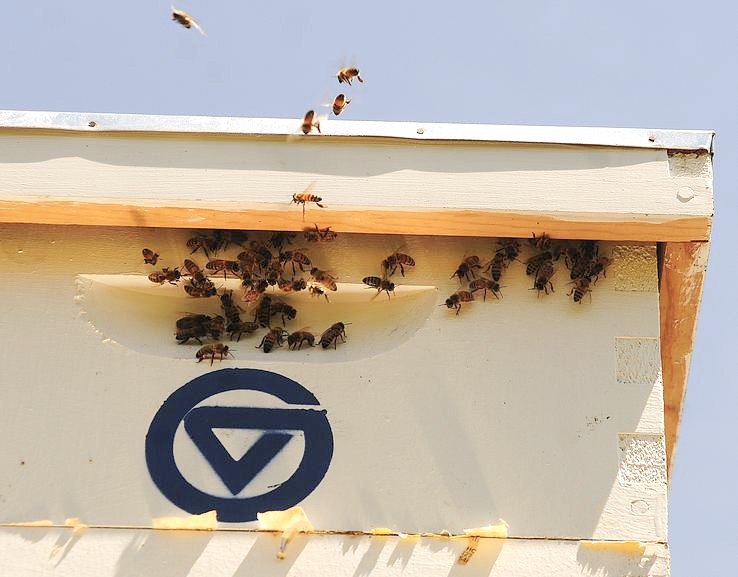GV Beekeeping Club works to save bees

Courtesy Photo / Dennis R.J. Geppert – Holland Sentinel
Sep 16, 2012
Grand Valley State University’s Beekeeping Club is hosting a “Harvest Party” Sept. 16 from 6 p.m. to 8 p.m. on Holland campus to celebrate its first season of keeping bees at GVSU and raise awareness of the impact of the honeybee on society. The task is of high importance, too, as the honeybee population in North America continues to decrease by 30 percent every year, according to experts at Crisis101’s ‘Operation Bee’ program.
“We need those bees,” GVSU student Erin Skidmore said in a statement about her first visit to the apiary. “We depend on them for survival, for sustenance. If we would only take the time, we could learn from them, their governance, their diligence, their zeal for life. “
The Harvest Party is an opportunity for people to learn more about these often annoying – and sometimes deadly – insects.
“The honeybee is responsible for pollinating a third of all of our food,” said Jennifer Holt, president of the Beekeeping Club. “Without bees, our grocery stores would look much, much different.”
GVSU’s Meijer Campus in Holland boasts the first and only apiary, a collection of beehives, in Michigan to be part of NASA’s HoneyBeeNet Project. The HoneyBeeNet Project is an observation and data collection effort that monitors bee population, climate changes and other changes in bees and their environment. This information could be essential to solving the mystery of the disappearing bees.
The bees were brought to Meijer campus in fall 2012 when Holt assisted Anne Marie Fauvel – a biologist, liberal studies professor and the faculty advisor for the Beekeeping Club – in writing a small grant proposal for an apiary to be built on campus.
“The grant covered the funds for two hives, five beesuits and tools, a honey extractor, bottles for the honey and other necessary items to get the project underway,” Holt said. “The Beekeeping Club will use the money from honey sales to help facilitate events throughout the year.”
Over the course of the 2012 winter semester, GVSU engineering students created a solar-powered beehive scale, which sits under one of the two hives in the apiary, while computer science students created software that compiles the information collected by the scale. The scale collects weight, internal temperature of the hive, external temperature and other data every ten minutes and then transmits it all to the HoneyBeeNet Project.
The disappearance of the bees is attributed to Colony Collapse Disorder (CCD), where hives are found with a living queen but void of adult bees or their dead bodies, according to the Agricultural Resource Service. The cause of the syndrome is currently unknown, but the information gathered by the HoneyBeeNet Project may be instrumental in discovering why the bees are disappearing.
“It is estimated by 2035, there will be no more bees in North America,” according to the Operation Bee website. “Already, the abundance and diversity of wild bee and honey bee species are becoming rarer. In some areas, there are not enough bees to even pollinate our crops.”
The Honey Harvest party will host activities like making beeswax candles, tasting honey and sharing children’s story-time. In addition, an apitherapist – someone who uses items from honeybees and their hives for illnesses and pain – will be attending to discuss the details of her career.
Everyone of every age is invited to attend this event to learn more about the disappearing bees.
For more information about the Meijer campus apiary, visit http://www.gvsu.edu/honeybees/. To learn more about the GVSU beekeeping club, visithttp://www.gvsu.edu/honeybees/ or look up GVSU Beekeepers on Facebook.






















